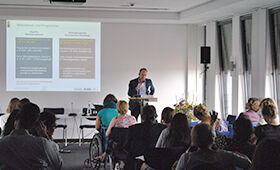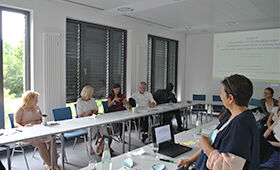How can refugees be successfully integrated into training?
Results of a joint workshop conducted by the Federal Institute for Vocational Education and Training (BIBB) and the Friedrich Ebert Foundation (FES)
With a view to consulting on possible solution strategies, experts from the fields of academic research, practice and policy making spent a day discussing the current challenges which exist with regard to making vocational education and training provision available to refugees. The conclusion they arrived at was that better general conditions, flexible standard provision and closer coordination at local government level are all required.

Between 2015 and 2017, around 1.4 million people arrived in Germany and submitted applications for asylum. Many have fled countries in which conflict and civil war are ongoing. It seems unlikely that they will return to their homelands in the foreseeable future. For those who are still young persons or young adults, vocational education and training represents one of the possible ways in which they can shape their lives and develop occupational prospects in Germany. At the same time, many companies are bemoaning the fact that they are unable to find sufficient numbers of trainees. However, the challenges begin with the issue of putting suitable education and training provision in place for a group of refugees which is extremely heterogeneous in nature.

How can we ensure that as many young refugees as possible who wish to enter training are afforded an opportunity to do so and are able to go on to complete such a programme? On 19 June 2018, the Federal Institute for Vocational Education and Training (BIBB) joined forces with the Friedrich Ebert Foundation (FES) to address this issue. More than 60 experts from the fields of academic research, policy making and practice were involved in presenting research findings and practical reports. They also identified specific areas in which action is needed and debated various possible solutions. The main focuses were on possibilities of accessing dual VET, schooling, preparatory provision at vocational schools and controlling cooperation at a local level.
The results which emerged from the discussions were as follows:
- Refugees frequently exhibit a high degree of educational aspiration and have a strong need for provision which enables them to obtain a vocational qualification or acquire such certification via the second chance route.
- The heterogeneity displayed by refugees with regard to prior learning represents a major challenge in terms of making sufficiently tailored provision available and facilitating access to vocational education and training.
- Personal support from mentors and company-based practical placements such as introductory training or short observational visits are viewed as being particularly effective in order to pave the way to training for refugees and for companies offering provision. The concepts of vocational orientation and vocational preparation are accorded a significant role in this regard. Within this context, it is particularly important that they are combined with language support and the imparting of basic knowledge of the German vocational education and training system.
- In order to offer a good learning environment, trainers, teachers and mentors require practice-related continuing training provision. This allows them to deal with the individual needs of the refugees.
- General legal, institutional, organisational, financial and spatial conditions must be improved for schools, companies, providers and administrative bodies if the challenge is to be successfully tackled. Particular objects of discussion in this regard were prolongation of the duration of training by a period of up to two years, expansion of part-time training provision, and uniform and extensive application of the instrument of special leave to remain in Germany for the purpose of pursuing training. One of the advantages offered by the first two approaches is an opportunity to integrate language support into training in a more effective manner.
- As opposed to provision which runs only for a short term, regular structures and provision which exhibit a high level of quality should be aligned in a more holistic way in order to ensure, expand and foster continuous support. The focus should be on the creation of reliable learning and development spaces.
- Local government control and local cooperation that cuts across legal spheres are crucial to successful education and training transitions. Further continuous development of concepts of local government coordination via networking and the dissemination of examples of good practice is particularly important.
- With regard to the vocational training of young refugees, the focuses always need to be on the integration capacity and sustainability of the VET system and on developing vocational education and training provision in such a way so as to deliver a benefit to all young people and young adults.
The results of the workshop will form an object of subsequent public debate. Within this framework, speakers such as Stephanie Matthes from BIBB, the MP Klaus Mindrup and Khaled Davrisch, a nursing and healthcare trainer who is himself from a refugee background, provided insights into their own understanding and experiences of how young refugees can find suitable training.